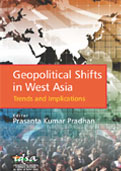India–Israel: The View from West Asia
The view from West Asia of India–Israel ties has been interlinked not only with the region’s negative perception of Israel but also with Israel’s evolving position in the West Asian geo-political framework. The growing economic and political power of India in the last two decades and its deepening economic ties with countries in West Asia, however, have brought new factors into play. This perspective, along with the promise of the positive role India can play in West Asian affairs, now colours the Arab appreciation of India–Israel ties as well.
- Sanjay Singh
- July 2017












